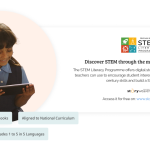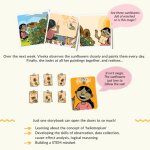Pratham Books StoryWeaver launches the STEM Literacy Programme!
India’s National Achievement Survey (NAS 2017)1 indicates that in Grade 3, only about 50% of students are above the basic levels of achievement in Maths, Science and Environmental Sciences (EVS), with the number getting progressively lower through Grades 5 and 8. The deep learning losses due to the pandemic have brought down the national average scores compared to 2017.2
India’s National Education Policy 2020 emphasises the importance of STEM (Science, Technology, Engineering, Math) skills and capacities, including scientific temper, evidence-based thinking and logical reasoning and the development of the creative potential of each individual. The need to nurture necessary STEM abilities at the primary grades, without expensive infrastructure requirements, is paramount.
This need is felt at a global level too. 2022 is the International Year of ‘Basic Sciences for Sustainable Development’, and this is also the theme for World Science Day – November 10, 2022. As part of these observances, UNESCO is highlighting the importance of giving children access to quality science education from an early age, to encourage them to ‘develop curiosity’ and ‘value the quest for truth’ – vital not only from an academic perspective, but for personal growth as well.3
As a response, Pratham Books StoryWeaver has launched a STEM Literacy Programme which aims at sparking discovery and engagement across a broad range of STEM topics through the power of storybooks. The programme is a rich teacher resource centered around 200+ storybooks for Grades 1 to 5, with national curriculum-aligned topics, structured lesson plans, engaging activities and teacher training resources. In addition to English, the programme will soon be available in Hindi, Marathi, Urdu and Odia. The programme is freely accessible online on www.storyweaver.org.in.
Purvi Shah, Senior Director – StoryWeaver and Strategy, Pratham Books, says, “At Pratham Books StoryWeaver, we have a strong belief in the potential of story-based learning and the immense value that stories can add to a classroom. The STEM Literacy Programme uses storybooks as a learning tool to bring alive Science, EVS, and Maths concepts in engaging ways, and planting these concepts in a relatable world that children can understand, imagine, and enjoy. STEM literacy helps cultivate a certain way of thinking, observing, and problem solving, which can help young learners in all areas of life. As we try to mitigate the learning losses of the pandemic, we must help our children develop a STEM mindset and nurture the next generation of responsible citizens, problem solvers and change makers. And how wonderful it would be if we can inspire them with a story!”
Keerti Kadam.



